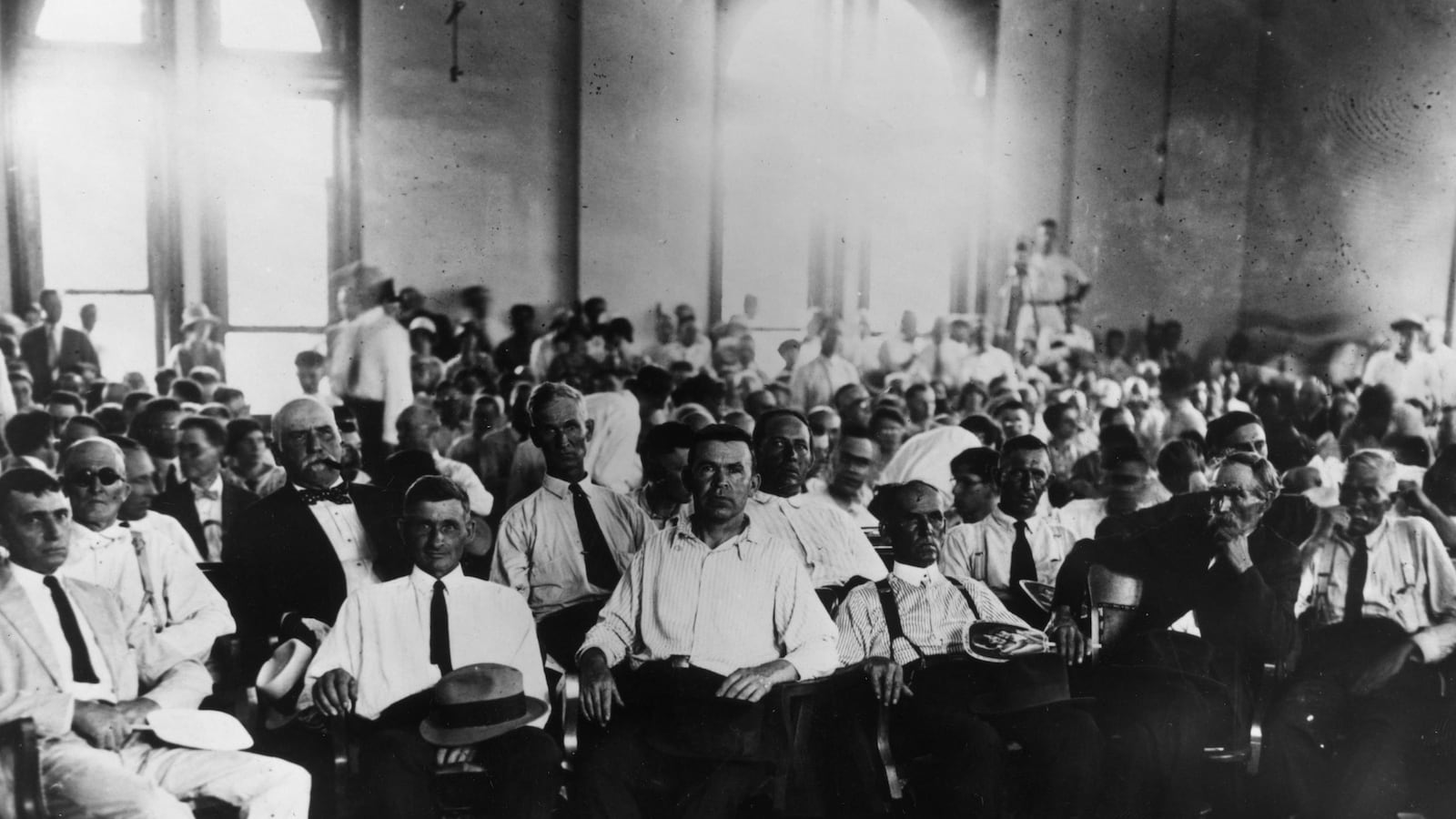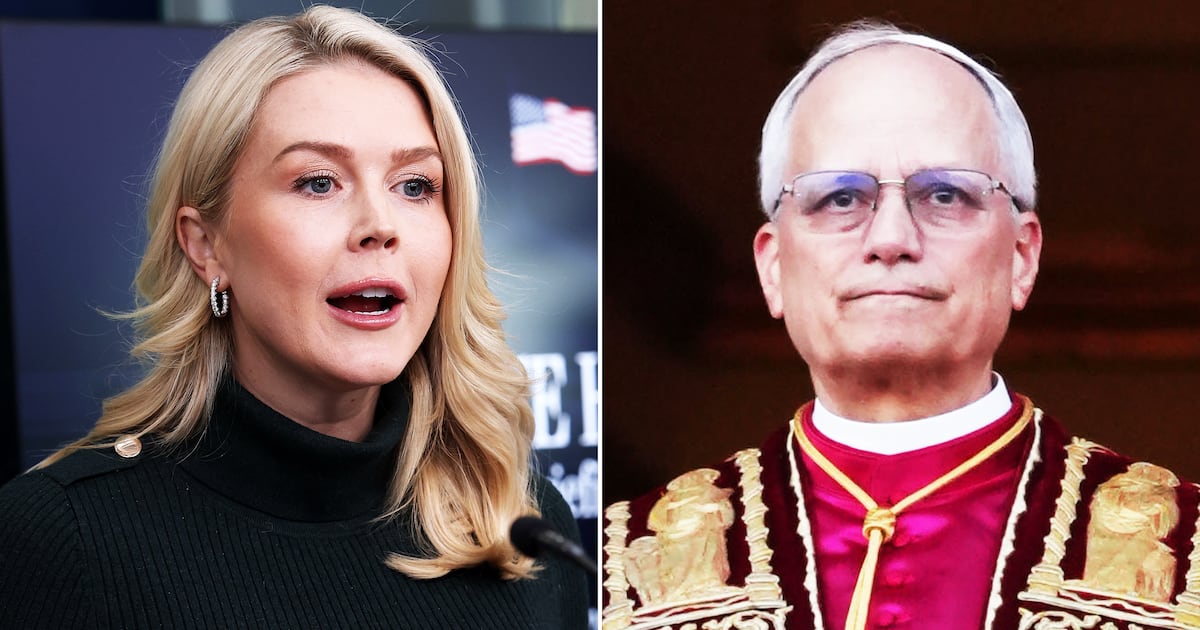In the classic style of southern Appalachia, Dayton, Tennessee, has abandoned coal mines, epidemic obesity, and a median income that’s half the national average.
Dayton is also famous, loosely speaking. In July 1925, the town hosted the Scopes Monkey Trial, a landmark case in the history of creationism. Eighty-nine years ago Monday, a Dayton jury found John Scopes guilty of teaching evolution in his classroom, in open disregard of Tennessee law, and fined him $100.
One feels, walking around Dayton, as if it has been swallowed whole by its stories—stories from the Bible, for sure, but also the grand fiction of the trial that has come to define the town. Torn by schism, 89 years ago—and torn again, today, by an evolutionary dispute at its little evangelical college—Dayton exemplifies two useful truths about the whole creationists-and-evolutionists hoopla. One: People enjoy a good fight. And, two: A nice, predictable performance has a way of subsuming the facts.
I spent part of this past weekend in Dayton for the town’s annual Scopes Trial Play and Festival. I toured the town in a tiny yellow school bus, met some relatives of the legendary boy named Sue, and attended a two-hour, music-infused reenactment of the trial, during which the audience sang hymns and the actor playing Clarence Darrow gave praise, in the final musical number, to religious freedom and the wisdom of the Bible.
On the county courthouse lawn, under the dripping leaves of century-old maples—each bearing a placard that reads “this tree witnessed the Scopes Trial”—I bought a snack from the Monkey Town Donut Company food truck, whose proprietor, fresh from Seattle, was wearing a fleece emblazoned with the logo of a Baptist convention.
Dayton’s been selling the Monkey Trial for years, and for much more than doughnuts. Sales were, really, the original intent. The Scopes Trial was a staged event, from start to finish. Pretty much every single participant was complicit in the effort to put on a show.
John Scopes, the schoolteacher, was not a prisoner of his conscience. Dayton was not a particularly religious town. The defense lawyers did not necessarily want their client to win.
Here’s what actually happened: The ACLU was looking for a test case to challenge Tennessee’s anti-evolution law. Dayton’s civic leaders, suffering from the loss of the coal and steel industries in the 1910s, were desperate for some kind of stunt that would bring attention, and perhaps investment, to the town. The anti-evolution law seemed like an opportunity. A few of those community leaders invited Scopes to the drugstore, bought him a fountain drink, and convinced him to stand trial.
The resulting affair mixed the doctrinal with the sensational: It was part Jonathan Edwards, part Nancy Grace. Three-time presidential candidate William Jennings Bryan, a staunch political progressive, showed up to assist the prosecution (which included a man named Sue Hicks, the inspiration for the Johnny Cash classic and a local attorney named for his mother, who died in childbirth).
Darrow, the country’s most famous lawyer, came out to help defend Scopes, whom he very much hoped would lose, so that he could take the case to a higher court. He knew the case was a farce. Darrow and his wife stayed at the home of the prosecution’s chief witness and supposedly coached him on how best to ensure the conviction of the client whom Darrow had been hired to defend.
The trial—a misdemeanor case—quickly turned into a grand debate, culminating in a cross-examination, on the Dayton courthouse lawn, of Bryan. The examination morphed into a far-reaching conversation between Bryan and Darrow on scriptural interpretation. Bryan, by many accounts, didn’t fare so well. He died of stroke a few days later.
With that, writes historian Edward Larson, “The fundamentalist movement acquired a martyr.” Dayton, meanwhile, had acquired some worried citizens. As one older Tennessean told festival-goers this year, a local woman fed Bryan a platter of sliced tomatoes and salt the day before his death. The woman was terrified that this odd meal had contributed to the corpulent orator’s passing.
The Scopes Trial was a formative moment for modern creationism. It was also the first trial ever broadcast by radio. Reels of film from the courtroom were rushed around the country and screened in movie halls. So many journalists showed up that some had to be housed on the second floor of the local hardware store.
That a media boom and a creationist surge should be connected is no coincidence. The Scopes Trial offered a drama that, like a Hallmark original movie, spun stereotypes into archetypes and then pitted them against each other to create a kind of morality play—one designed to appeal to people on both sides of the debate.
Here it was: Northerners versus Southerners; urbanites versus ruralites; a big-shot Chicago defense lawyer versus a mostly local prosecutorial team; Bryan, the champion of the common man, against the expert witnesses of the defense.
Genesis, at this point, almost seems like an afterthought. Journalists—in particular, the brilliant but fact-averse H.L. Mencken—portrayed Dayton as a crazed backwoods hollow, overrun with Pentecostals hell-bent on driving out the devil Scopes. A few decades later, Jerome Lawrence and Robert Edwin Lee formalized this whole crazed-Southerners-versus-intellectuals story in the hit play and movie Inherit the Wind.
The weird thing, really, is that Dayton began to grow into the role which history had assigned it. In 1930, Bryan College, inspired by William Jennings, opened in the town and quickly grew into a bastion of conservative evangelism in eastern Tennessee. In 2004, Dayton’s county found its way into national news again, this time by trying to ban homosexuality. Today, people meet weekly in the Dayton McDonald’s and sing gospel music.
And, since the 1980s, Dayton has held dramatic reenactments of the trial. Attracting people to downtown and re-creating an event that was itself a performance, the whole event manages to keep the Scopes Trial alive. Watching the reenactment is a surreal spectacle: The people of Dayton are still acting out the creationist debate, all in order to put on a show.
The trial never really ended. Those archetypes still bounce around today. Watching the Scopes Trial reenactment, or reading the commentary on the Ken Ham/Bill Nye tussle last February, one gets the sense that the whole damn debate over creation and evolution is not exactly a battle over origins but a veiled way for people to vent their rage against their fellow citizens, stereotypes at the ready.
That applies within creationist subcultures, as well, as Bryan College has recently made clear. Last February, the school’s president unexpectedly changed the school’s Statement of Belief, which all faculty must sign. Instead of affirming that they believe that God created the world, using relatively general terms, faculty must now assert that Adam and Eve were “historical persons.”
Faculty, citing academic freedom, have protested. They issued a vote of no-confidence against Bryan’s president. Some are suing the school. This past weekend, as Daytonians geared up for the festival, four members of the school’s Board of Trustees resigned over the administration’s handling of the situation.
Again, more is at stake here than evolution. Enrollment rates, the Chattanooga Times-Free Press suggests, are in trouble at Bryan. There’s been concern about doctrinal backsliding. In Genesis, one finds the place to draw the lines, and launch a fight.
Species may evolve, but historical forces, it sometimes seems, do not. The challenge for science communicators around the country is to figure out a way to disentangle facts from the subcultures that come to claim, or deny, them, and to make scientific ideas accessible to people regardless of where they fall on the tribal spectrum of our often fragmented society. The lesson of the Scopes Trial, after all, is not that some people are stupid science-deniers. It’s that scientific fact can all too easy be spun up into performances and archetypal dramas, until what’s at stake is something that goes far deeper than the details of evolution.






